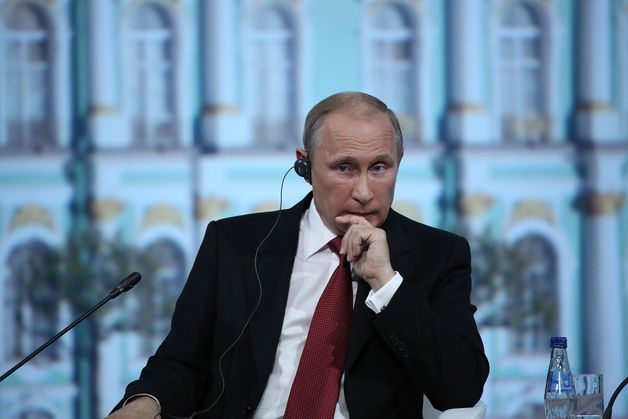 Russia's president Vladimir Putin.[/caption]
Russia's president Vladimir Putin.[/caption]Aug. 9 (Bloomberg) �- Border guards in Russia and Belarus moved swiftly yesterday to enforce�Vladimir Putin�s ban on food imports from the European Union, turning back trucks loaded with cheese, yogurt and meat, according to officials from Lithuania and�Estonia.
That the two Baltic states, both former Soviet republics, were among the first to feel the impact of the retaliatory blockade is no coincidence. Along with nearby�Latvia�and Poland, they are heavily reliant on exports to Russia. As an example, the products on the banned list that Lithuania exported to Russia last year accounted for almost 2.5 percent of its gross domestic product, according to research company�Capital Economics. Food producers in the four countries are worried.
�This is unpleasant news, causing uncertainty for the future,� Sergey Beskhmelnitsky, chief executive officer of Food Union, a Latvian dairy producer that sends half its exports to Russia, said by e-mail yesterday. �No truck is now allowed to enter Russia with our products, which poses huge problems for local farmers,� said Zdzislaw Mlonek, CEO of Pieczarka Siedlecka, a Polish mushroom exporter.
Poland�and the three Baltic states have been among the most concerned by Russia�s annexation of the Crimea peninsula and its amassing of troops on�Ukraine�s border, reflecting an anxiety that they could end up the next victims of Putin�s desire to restore his country�s Soviet-era domination of eastern�Europe.
Economic Pressure
While the food ban has been interpreted largely as a retaliation against European and U.S.-led sanctions on Russia, it is also seen as a further tightening of the screw on former Soviet satellite states: by economic means.
�It appears that Russia does target the Baltics and Poland for their political positions,� said Otilia Dhand at Teneo Intelligence, a New York-based consulting firm. �Poland was singled out for a ban on its apples before the blanket sanction on all EU food imports was imposed. But an even more obvious example is�Lithuania, which was a target of a Russian food imports ban last year.�
Based on data from Eurostat, Russia was the destination for 19.8 percent of Lithuania�s exports last year. For Latvia, Estonia and Poland it was 16.2 percent, 11.4 percent and 5.3 percent respectively.Finland, which has been less critical of Russia over Ukraine, will nonetheless be affected, with 9.6 percent of its exports going there.
Hurting Growth
The ban may knock 0.2 percentage points off Lithuania�s GDP growth this year, said the country�s economy minister. Estonia�s exports of goods that have fallen under Russian sanctions totalled 42.7 million euros ($57.3 million) in the first half, or 7.9 percent of the country�s food exports and 0.7 percent of total exports, according to Maris Lauri, an economic adviser to Prime Minister Taavi Roivas. The two countries joined the European Union in 2004, at the same time as Poland and Latvia.
�A sudden stop in food exports to Russia could cause Lithuania�s economy to slow sharply,��Neil Shearing�and�William Jackson,emerging markets�economists at Capital Economics, wrote in a note to investors. To limit the impact, Lithuania may be able to sell its products to other markets, they said.
It�s not the first time in the past 12 months that Russian bans have hit its neighbor. Lithuanian farmers are still suffering the hangover from a Russian ban on their dairy products in October.
�Plan B�
Since then, Vilkyskiu Pienine AB, a Lithuanian cheese maker which makes about a fifth of its sales in Russia, reduced its share of sales to Russia by 7 percentage points this year and was already planning to reduce exposure by the end of the year.
�We�ve been preparing ourselves for plan B, for additional challenges because things like this were expected in this geopolitical environment,� Gintaras Bertasius, Vilkyskiu Pienine�s managing director, said by phone yesterday. �The ban will have an impact on our financial results, yet we�re not going to slow production but will work on how to redirect products to other markets.�
Estonian Farming Minister Ivari Padar said in a statement on the ministry�s website yesterday that �even though�Russia�s share of Estonian agricultural exports has declined over past years, it remains an important market for us, taking about a fifth of our output.�
While the western EU nations appear to have escaped the worst of the damage from the sanctions, there was still a warning from�Hungary�about the impact of the Baltic states and Poland redirecting their food products to other European markets.
�All affected companies will be seeking to sell their products initially destined for Russia in Europe and to a much lesser degree in�Asia,� said Gyorgy Vamos, secretary general at the Hungarian Trade Association. �Russia�s ban will create a huge glut of food products on the European market which in turn will exert strong downward pressure on prices.�
By Bloomberg
The Iran Project is not responsible for the content of quoted articles.











